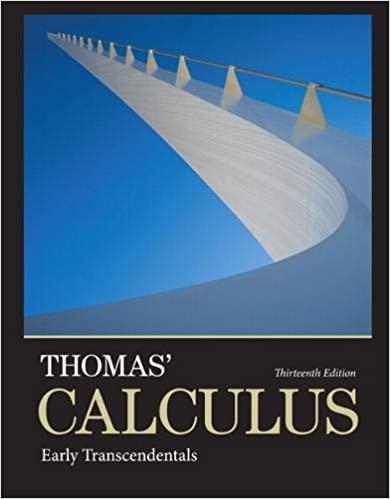Question
2. Let u(x, y, z) be a solution to the Laplace Problem: u = 0 (x,y,z) u(x, y,x,z) = f(x,y,z) (x, y, z) an.

2. Let u(x, y, z) be a solution to the Laplace Problem: u = 0 (x,y,z) u(x, y,x,z) = f(x,y,z) (x, y, z) an. If w(x, y, z) is a twice continuously differentiable function such that w(x, y, z) = f(x, y, z) on an show that vw|dxdydz. 22 Vudxdydz 22
Step by Step Solution
There are 3 Steps involved in it
Step: 1

Get Instant Access to Expert-Tailored Solutions
See step-by-step solutions with expert insights and AI powered tools for academic success
Step: 2

Step: 3

Ace Your Homework with AI
Get the answers you need in no time with our AI-driven, step-by-step assistance
Get StartedRecommended Textbook for
Thomas Calculus Early Transcendentals
Authors: Joel R Hass, Christopher E Heil, Maurice D Weir
13th Edition
978-0321884077, 0321884078
Students also viewed these Mathematics questions
Question
Answered: 1 week ago
Question
Answered: 1 week ago
Question
Answered: 1 week ago
Question
Answered: 1 week ago
Question
Answered: 1 week ago
Question
Answered: 1 week ago
Question
Answered: 1 week ago
Question
Answered: 1 week ago
Question
Answered: 1 week ago
Question
Answered: 1 week ago
Question
Answered: 1 week ago
Question
Answered: 1 week ago
Question
Answered: 1 week ago
Question
Answered: 1 week ago
Question
Answered: 1 week ago
Question
Answered: 1 week ago
Question
Answered: 1 week ago
Question
Answered: 1 week ago
Question
Answered: 1 week ago
Question
Answered: 1 week ago
Question
Answered: 1 week ago
Question
Answered: 1 week ago
Question
Answered: 1 week ago
Question
Answered: 1 week ago
View Answer in SolutionInn App



